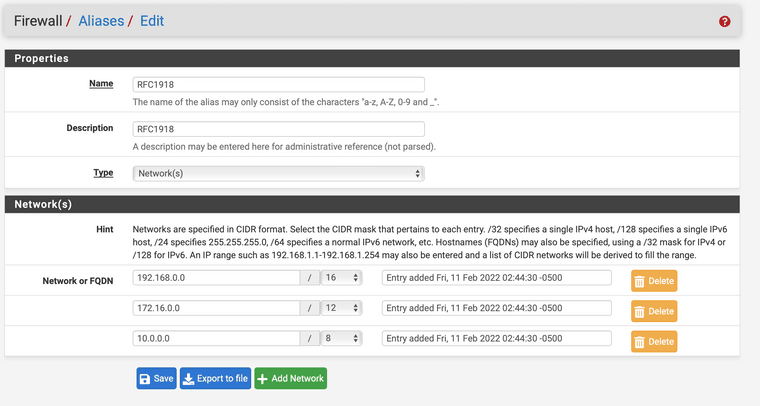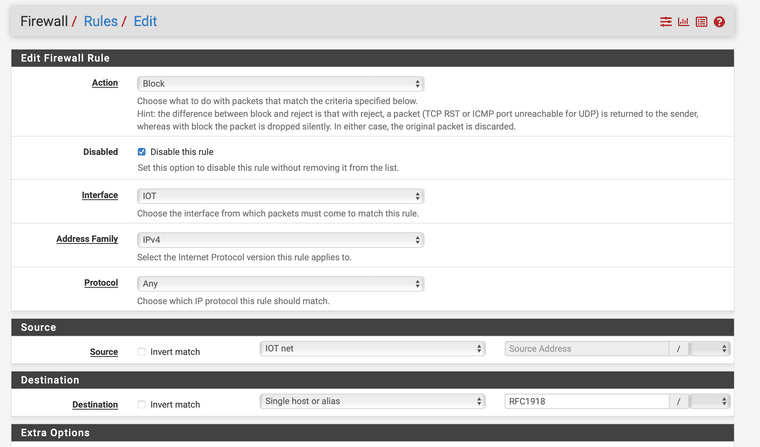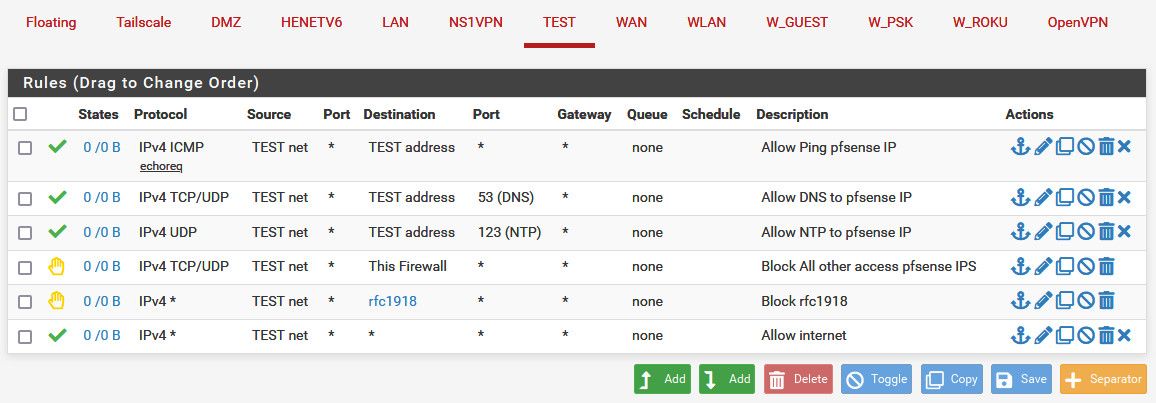Simplied method of preventing inter-VLAN communication
-
I'm setting up a site with several VLANs. I want the management VLAN to be able to communicate with the other VLANs but I don't what the other VLANs to be able to inter-communicate. Instead of setting up a specific rule I though I would just set up a firewall rule on each VLAN that blocks all traffic from the VLAN subnet to an alias called "RFC 1918". That alias includes local network IP ranges. This works well, except devices are unable to connect to the firewall to resolve DNS. That makes sense, but begs the question; How do I create specific exclusions? When I tried to create a rule to allow the VLAN subnet to reach the IP of the firewall it was still being blocked. Right now I have:
Block VLAN Net to "RFC 1918"
Allow VLAN Net to Gateway IP
Allow VLAN Net to AllSince that doesn't work, I'm thinking maybe the first and second rules need to be switched. If that's the answer, how do I do it with pfBlocker since it will just place both "Allow" rules before the "Block" rule. What part of the process am I missing?
-
First make a rule to pass what you want, then the block all rule.
-
@Stewart said in Simplied method of preventing inter-VLAN communication:
Right now I have:Block VLAN Net to "RFC 1918"
Allow VLAN Net to Gateway IP
Allow VLAN Net to AllpfSense does "first match" from top.
So everything (to RFC1918) will match your block rfc1918 , and "die there"
As jknott wrote:
Do the RFC1918 allows first , then block all other RFC1918.
Allow VLAN Net to Gateway IP
Block VLAN Net to "RFC 1918"
Allow VLAN Net to AllEdit: I have no idea about pfBlocker messing with the rules - don't use it
/Bingo -
@bingo600 said in Simplied method of preventing inter-VLAN communication:
Edit: I have no idea about pfBlocker messing with the rules - don't use it
hint: it doesn't. it only adds rules about lists it manages and only if you say so.
so as I don't see anything in those rules about a list from pfbng it has nothing to do with it. If you wanna add pfb rules later or by yourself, don't tell it to"automatically" add rules to interfaces but to create aliases for those lists and create the rules yourself.
-
For something like passing access from several interfaces to a specific DNS server you can use an interface group.
Make an interface group containing all of the inside interfaces.
Create a rule on the interface group that passes TCP/UDP on port 53 to the specific DNS server address or, perhaps, This Firewall (self).
-
I wanted to follow up with how I ultimately got my rules working for when someone stumbles on this in the future.
- pfBlocker is set to default rule order
- Allow IPv4+6 ICMP from VLAN net to VLAN address on any port = Allow Ping on the Interface
- Allow IPv4+6 TCP/UDP from VLAN net to VLAN address on port 53 = Allow DNS resolution on interface
- Block IPv4+6 * from VLAN net to RC1918 alias on any port = Block Access to other (V)LAN Networks
- Allow IPv4+6 * from VLAN net to any on any port = Allow everything else on interface
This appears to do exactly what I want so I wanted to share what I've got for anyone else to use in the future if it helps.
-
@stewart You might want to change Block to Reject so connections get rejected instead of just hanging until they timeout so users get immediate feedback. That is usually preferable to block for connections originating from the inside.
You might also consider adding a Reject rule near the RFC1918 rule to destination This firewall (self).
You are also passing IPv6 but are not blocking anything. You might want to do the same with ULA (fc00::/7) and whatever your local IPv6 addresses are whether GUA or RFC4193 or both or whatever.
-
@derelict said in Simplied method of preventing inter-VLAN communication:
@stewart You might want to change Block to Reject so connections get rejected instead of just hanging until they timeout so users get immediate feedback. That is usually preferable to block for connections originating from the inside.
Yes, I can see how that would be useful. Thanks.
You might also consider adding a Reject rule near the RFC1918 rule to destination This firewall (self).
Why do you think I would need that? With the rules as they are they are unable to get to the GUI or establish an SSH connection. Since the IP of the firewall exists inside of the RFC1918 space it gets blocked. Is there something I'm not seeing?
You are also passing IPv6 but are not blocking anything. You might want to do the same with ULA (fc00::/7) and whatever your local IPv6 addresses are whether GUA or RFC4193 or both or whatever.
TBH I don't have much experience with IPv6 and normally have it off. I'm just starting to add it in to see how things behave. I'll look into these, thanks.
-
@stewart said in Simplied method of preventing inter-VLAN communication:
Why do you think I would need that? With the rules as they are they are unable to get to the GUI or establish an SSH connection. Since the IP of the firewall exists inside of the RFC1918 space it gets blocked. Is there something I'm not seeing?
Try connecting to the webgui using your WAN address.
-
@derelict It just times out.
Edit: Oh, I see. From inside that VLAN. Yes, it opens up. So that rule stops them from connecting to the WAN from the VLAN. I never thought of that. Thanks for that tip! I've put it in and it's working now. And by working, I mean it doesn't connect. :)
-
@stewart said in Simplied method of preventing inter-VLAN communication:
I wanted to follow up with how I ultimately got my rules working for when someone stumbles on this in the future.
- pfBlocker is set to default rule order
- Allow IPv4+6 ICMP from VLAN net to VLAN address on any port = Allow Ping on the Interface
- Allow IPv4+6 TCP/UDP from VLAN net to VLAN address on port 53 = Allow DNS resolution on interface
- Block IPv4+6 * from VLAN net to RC1918 alias on any port = Block Access to other (V)LAN Networks
- Allow IPv4+6 * from VLAN net to any on any port = Allow everything else on interface
This appears to do exactly what I want so I wanted to share what I've got for anyone else to use in the future if it helps.
Hi @Stewart - I appreciate this post is rather old(ish) now, but I was curious about where you set these rules up. Were they per interface or did you create an Interface group and apply them there?
-
@lees Per interface. I like being able to go to an interface and explicitly see all of the rules that are applied to it so I tend to not use floating rules.
-
this post was just what I was looking for, because I was super frustrated with preventing inter-vlan traffic... so just to make sure I understood the thread, my crypto vlan is .100, and when I added the rfc1918 rule, I couldn't get on the internet with my computer on that network, but when I added the allow rule above to 10.0.100.1, I could, so this setup would prevent inter-vlan traffic, but allow internet, correct? if machines on that network never need to communicate with each other, I could also delete the #3 rule of allow all to all too?

is this post correct?
https://forum.netgate.com/topic/60549/solved-disable-inter-vlan-traffic
if so, does the allow rfc1918 inverted produce the same result as my block rfc1918 and allow all rule after? I'm trying to block inter vlan and allow internet on this vlan.
thanks.
-
This post is deleted! -
@appleguy said in Simplied method of preventing inter-VLAN communication:
if so, does the allow rfc1918 inverted produce the same result as my block rfc1918 and allow all rule after? I'm trying to block inter vlan and allow internet on this vlan.
I assume 10.0.100.1 is the IP of pfSense in the crypto subnet? I'd rather not open up the whole IP but only the ports you have to (I further assume, NTP and DNS would be sufficient for that, so UDP 53/123 would be enough as DHCP is automagically opened when used). But if an potential inside attack on the firewall isn't the scope/problem, that's fine.
Besides that, blocking RFC1918 (I would recommend REJECT instead of BLOCK as you are coming from inside and most likely want the client to get noticed that he is rejected from doing what it's trying so it can timeout faster) would most likely be enough to separate that VLAN from the rest (if all of them are in the RFC1918 IP space). Allowing "any" afterwards would result in "any IP besides private ones". That could - depending on your general setup and configuration - open up the public IP of pfSense to be accessed from that subnet, so if you want to go for "full isolation" and "complete protection of the firewall box itself", I'd recommend a 4-rule ruleset.
- ALLOW from Crypto_Net to Crypt_Address (avoid IPs in favor of aliases) Protocol IPv4/UDP Ports "Infra" (and create a Port Alias "Infra" for infrastructure ports with 53 and 123 in it for DNS and NTP. If you don't need NTP, you can simply select DNS from the Port dropdown instead)
- REJECT from Crypto_Net to "This Firewall" any any --> reject any requests to the firewall other then DNS/DHCP as it is not to be managed or accessed from this isolated subnet
- REJECT from Crypto_Net to "RFC1918" any any --> like before reject all requests to other private IPs, VLANs, VPNs etc.
- ALLOW from Crypto_Net to any --> allow the rest e.g. the internet in that case.
That's it for most use cases.
The short form used in the post you linked with "ALLOW not RFC1918" would be sufficient if you aren't going to protect the firewall itself any further. It's a bit more open and if you want to add further blocks it's not very convenient. Most times, people struggle with NOT logic and try to add further rules after that one, what would require AND logic that isn't happening. So not only is the 4-steps above more thorougly secure but also avoids pitfalls due to NOT logic and clearly states what's happening.Also you can further increase security of that VLAN by e.g. adding a few blocklists via pfBlockerNG and add them just before the final 4th rule (insert between 3rd and 4th) to strengthen the security further. That would be hard to do with the 2-rule not-style approach.
Cheers
-
@appleguy So, the RFC1918 rule shouldn't block the internet since all internet IP are route-able and would be outside of the RFC1918 rule. In this instance it looks like the Crypto Subnet is 10.0.100.0/24 and The Crypto Gateway is 10.0.100.1. Your device would presumable have an IP between 10.0.100.2-254. The RFC1918 rule would prevent traffic destined for 10.0.100.1 but should allow any traffic not destined for it to still be route-able.
Maybe you are missing some of the other rules? For example, if DHCP gives the router for DNS then you need a rule to allow your subnet to communicate with the gateway on port 53. I don't see that in your list. That's why I explicitly allow ICMP and DNS and then block all RFC1918 and then allow all. That is likely the problem since it was solved by allowing communication to the firewall.
You can choose how you want it to work. You can leave it as is and have full access to the firewall from that subnet, that's fine. For our clients, we wouldn't want a subnet like that to have any more access than required so only ICMP (to test that the network is up) and DNS (so devices can resolve to the internet) and allowed. You could circumvent the DNS rule if you use external DNS servers. You could also do away with the ICMP rule if you don't want to be able to ping the router to test connectivity.
In addition, as @JeGr and @derelict eluded to, use reject instead of block and also have a rule to reject traffic from the subnet to "This firewall (self)". Those should be added as well.
-
still blocking internet access on my home assistant on this IoT vlan. thought I had it sorted out, and haven't made the changes answered above, but am I missing something? my home assistant can download updates or even reboot properly if this rfc1918 block rule is enabled, but it the setup I posted above does seem to work fine for the crypto vlan. it's so weird, because the rfc1918 is the only block rule on the IoT vlan, and I have the allow rule to the appropriate .1 address, same as crypto vlan.


-
@appleguy and where are you pointing for dns? If it was say the IP address of pfsense (rfc1918) on your iot network - you blocked it.. So yeah internet stuff not going to work via dns.
Here is a what you might use for a typical locked down vlan.

This allows talking to pfsense IP on this vlan for dns and ntp, and also allows clients on this network to ping pfsense IP (connectivity testing for example).
But blocks all other access to any firewall IP - prevent access to gui on this network, or even say the wan IP (which is commonly public IP)..
Blocks access access to any other local network/vlan - and then at the end allows internet.
-
-
@appleguy if that is where your pointing for dns - but that rule shows zero evaluations - see the 0/0 nothing has matched that rule.